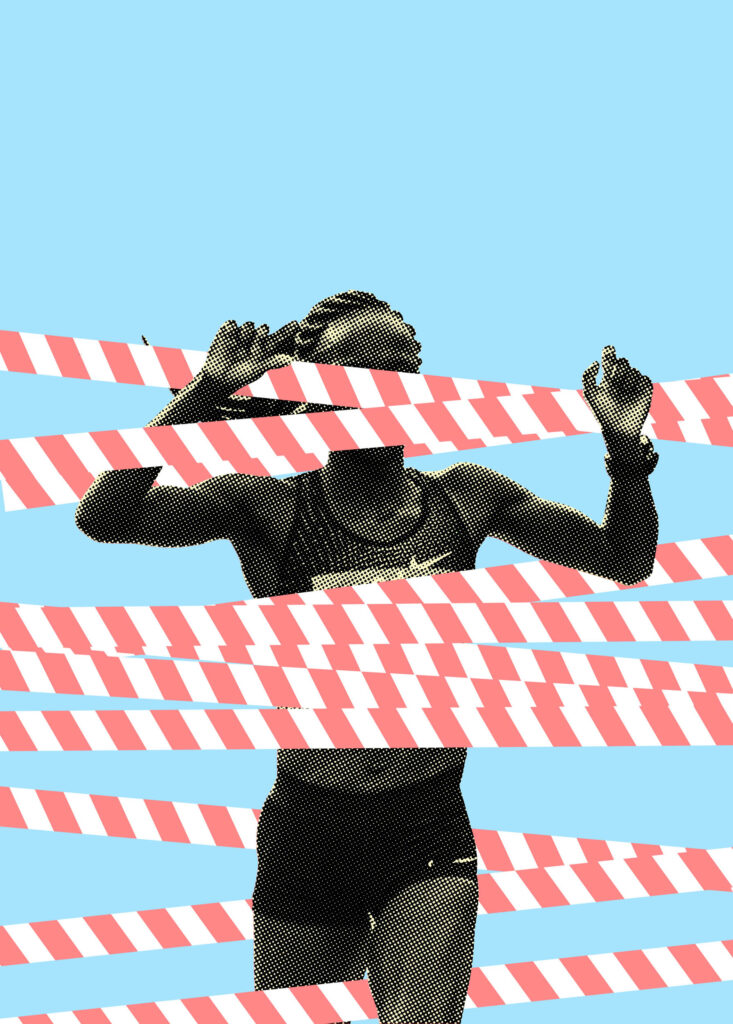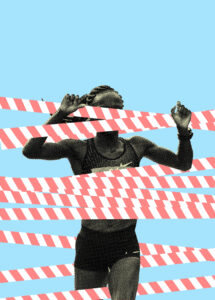In the fall of 2020, Selemon (not his real name) received an email announcing that a marathon race would be held in the Czech Republic. As an Ethiopian-born long-distance runner living in Europe, Selemon had been training throughout the pandemic. Like many of his peers who rely on prize money and appearances for a living, he’d been struggling. His bank account was drying up, and his resolve was weakening too. Here, finally, was an opportunity.
As he read on, his optimism waned. The half marathon of Mattoni Ústí nad Labem would not only have limited funds, require entrants to undergo COVID-19 testing, and be confined to specific regions. It had another, unusual stipulation. Entry was reserved to European-born or raised runners alone. Selemon was excluded from the competition.
Along with other East African runners, who have long lived in Europe and sometimes struggled to obtain citizenship, Selemon was infuriated. It is common for European sport clubs to sign immigrant athletes, but their treatment of them is often disrespectful. Some days they are praised for their spectacular accomplishments, other days they are barred from competition altogether. At times, they are even accused of possessing unfair genetic and environmental advantages, having come from the East African highlands to steal spots from their European-born counterparts.
“A funny thing happens when you do well,” Swedish Olympian and long-distance runner Mustafa Mohamed reflected. “When you’re not ‘Swedish’ and you do well, people celebrate you and see you as one of them. But if you do something bad, you are seen as an outsider—you are Somali, or something else.”
Mohamed, who was born in Mogadishu, Somalia, has experienced both sides of this coin. He moved to Sweden aged eleven, with his mum and Swedish stepdad, to flee the Civil War. Sport was one way he began adjusting to life in an unfamiliar place. He started playing football and realised that, while not necessarily the most skilled on the field, he could outrun and outlast his competitors. He thought he could better challenge himself on the track.
“I found success quickly,” he recalls. “I joined the running club in 1995 and by autumn, I was the best in the country in my age group.” He soon realised he was being treated differently than before. “People started to congratulate me and tell me they were happy for my success. That boosted my ego and made me want to run even more.”
In Lysekil, Sweden, Mohamed continued to train with a few fellow Somalis. At the time, theirs was one of the few clubs that included immigrant athletes. “They thought we were faster than them because we were Black, which is actually a good thing. It’s good if your competitors are intimidated,” Mohamed reflected. But then rules and regulations began to shift in favour of native athletes.
As more and more East African-born athletes won competitions in Sweden, federations began to restructure prize money so that there were more opportunities for Swedish athletes to thrive. Membership of a Swedish club became a requirement for entry into competitions, making it harder for immigrant runners to be eligible.
Sweden’s club system still offers more opportunities for participation than other European countries, where citizenship is usually an entry requirement. It can take up to ten years for East African athletes to get full citizenship in their new country. During this time, even though they live and train there, they lose out on thousands of euros in prize money, racing opportunities, and potential sponsorships. Many of them quietly endure financial struggles as they await the processing of their application.
Ethiopian athlete Bereket Mitiku is still in the earlier stages of becoming a Spanish citizen. Bereket, who goes by Becky, is from Bekoji, the birthplace of many long-distance running icons, like the first Black African Olympic gold medallist Derartu Tulu and Olympian champions and former world record holders Kenenisa Bekele and Tirunesh Dibaba. As a child, he dreamt of joining their ranks.
“I didn’t have a lot of interest in leaving Ethiopia at first,” Mitiku remembers. “In 2010, everything was set to go and I was training really hard. I had really high morale and was doing well, but a week before the competition, the Ethiopian Athletics Federation picked another guy. They chose someone who was not actually under the age of 20, which was an entry requirement. I was so defeated at the time that I stopped running altogether.”
Frustrated by the lack of accountability to regulations and transparency in African sport, Mitiku thought running elsewhere might provide fairer opportunities. He began training in Addis Ababa, travelling back and forth three times a week from Bekoji by bus, over three hours each way. There he ran into a Spanish film production company, Zanskar Productions, who were producing a programme about runners in Ethiopia. They wrote Mitiku an invitation letter and he was granted a three-month tourist visa to Spain. He travelled to León, and began training with a club. For over a year, Mitiku would go back and forth between Spain and Ethiopia, getting short-term visas each time. He began learning Spanish and gradually got used to the culture. Despite the culture shock, training was going well as he moved up from sprints to middle-distance events. But getting into races didn’t prove quite as easy.
“They had regional competitions in Spain and I finished second in the 1,500 metres. But when they gave out the prize money they skipped me. The person in third place received my prize and the one in fourth place got the third-place prize. They told me that because I didn’t have citizenship, I wasn’t entitled to the money.”
In another instance, Mitiku had confirmed entry into a race both over the phone and via email. When he arrived, his name was not on the start list. “When I asked them why, they said another athlete had asked to compete and they had given him my spot.” Similar stories shed light on the questionable handling on the part of European sport federations of foreign-born athletes. They showcase their participation as proof of the multiculturality and inclusivity of the sport. But they don’t guarantee that they are treated fairly until they’ve become citizens.
Even reaching the highest achievements may not secure an athlete’s ability to make a living from the sport. This was the case with Mohamed, who qualified for the Olympics in 2004, and received an outpour of support. Local newspapers celebrated his accomplishment. Material benefits followed, with his first contract with Swedish apparel company Craft. Later, after making the Olympics again, he would sign with Puma, along with other sponsors. He currently trains at YMR Track Club, but works part- time for sports nutrition company Maurten to support his family and his training.
The opportunity for athletes to make a salary and get sponsors, in fact, is about much more than being fast—it has to do with being marketable. One agent who works with both African and European athletes told me in confidence: “African immigrants who represent European countries should have a broader appeal, but they don’t in domestic markets.” The result, unfair as it may be, is that their contracts are often lower, shorter, and of lesser value.
A complicated tension can arise even as athletes climb the competition ladder. What does it mean to wear a singlet representing the flag of a country which for so long deemed one’s presence unsuitable? How does it feel to train hard to earn significantly less money than one’s white counterparts, after being denied earnings for up to ten years?
Mitiku continues to train and excel, but he still finds himself in this strange limbo. His residence permit allows him to travel back to Ethiopia to visit his family, and train in Spain. But sometimes this creates problems of its own. “People back home ask me all the time for money and things from Europe,” he explains. “They expect that because I’m still training and living abroad, I have a lot to offer.”
This is a common experience for returning migrants of all stripes. For athletes living abroad, expectations of shared wealth often multiply. Even as Mitiku’s results continue to improve, bureaucratic obstacles to his career compromise his lifestyle abroad and his relationships at home.
Should he come to represent Spain one day, the country may well bask in his glory. Yet as long as the European sport system’s discrimination problem isn’t addressed, many other hopeful athletes like Mitiku will likely go through a similar experience.



